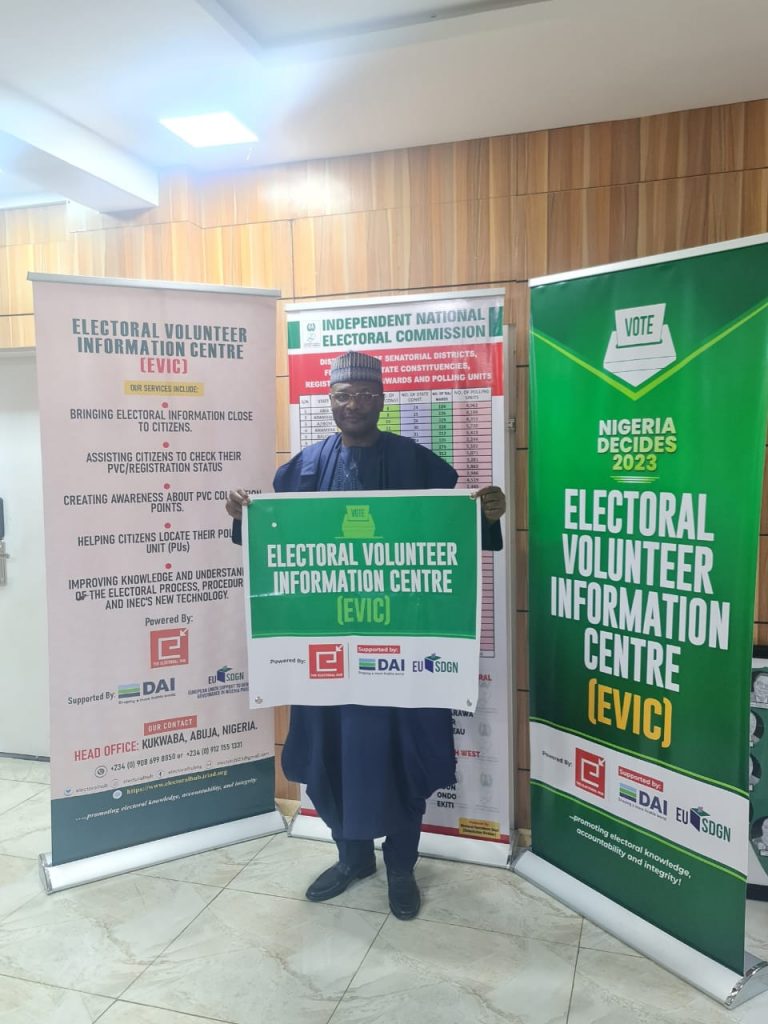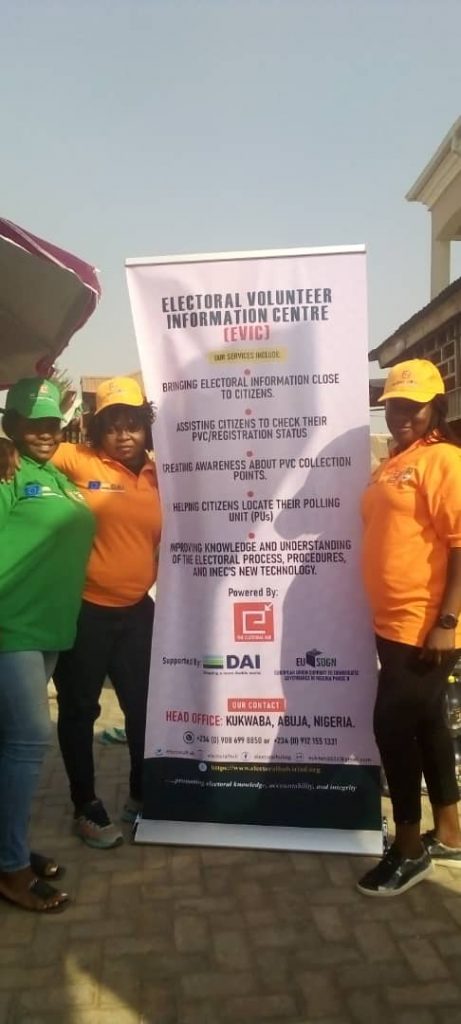By Chimezie Godfrey
As part of its efforts in assisting the INEC conduct free, fair and credible general elections, The Electoral Hub has launched the Electoral Volunteer Information Centre (EVIC) to foster civic engagement, educate and mobilize voters.
The Executive Director, IRIAD-The Electoral Hub, Princess Hamman-Obels said the EVIC project which was launched with the support of DAI/EU-SDGN has been flagged off in the Federal Capital Territory (FCT), Kano and Lagos states.

Hamman-Obels disclosed that the EVIC project was aimed at civic engagement and education of voters in preparation for the general elections.
According to her, the objectives of the EVICs include bringing electoral information close to the electorates/public/citizens, improving knowledge and understanding of the electoral process, procedures, INEC’s new technology and promoting women, youths, and PWDs’ participation in the electoral process, among others.

She said,”The Electoral Hub with support from the DAI/EU-SDGN launched the Electoral Volunteer Information Centre (EVIC) in the Federal Capital Territory (FCT), Kano and Lagos States. The EVIC project is primarily aimed at civic engagement and education in relation to the forthcoming 2023 General Election. This intervention is also in furtherance of engaging citizens and mobilizing voters for election being a pillar of the electoral process and deepening citizens’ engagement to ensure electoral integrity.
“The objectives of the EVICs include bringing electoral information close to the electorates/public/citizens, assisting citizens to know their PVC status and collection points, sensitizing citizens about their Polling Unit (PUs) locations and access, improving knowledge and understanding of the electoral process, procedures, INEC’s new technology and promoting women, youths, and PWDs’ participation in the electoral process.

“In other words, at the EVICs, citizens are provided with different electoral services such as assistance in checking for polling units, voters registration status, PVC collection centers, as well as provided information about the BVAS and other electoral information.”
Hamman-Obels noted that the electoral period particularly in Nigeria has always been a volatile period and has been surrounded by misconceptions and political apathy, adding that misinformation and disinformation have been the order of the day as politicians have adopted it as a means of sabotaging their counterparts.
She therefore said that the purpose of establishing EVIC was to raise the level of involvement of the electorate in the electoral process, by improving their knowledge and understanding of INEC’s policies, procedures, and technology through voter education, expanding inclusivity and thereby promoting overall participation in the electoral process.
“We believe this will help to curb electoral illiteracy ahead of the 2023 general election as individuals would be enlightened on the correct information about the election.
“Due to these concerns and in line with The Electoral hub’s commitment to promoting electoral knowledge, accountability, and integrity, the EVIC was conceived to breach the knowledge gap amongst the electorate about the electoral process.
“Forty EVICs have been deployed across 3 locations, namely the Federal Capital Territory (FCT), and Kano and Lagos States. There are EVICs in all area councils of the FCT: Abaji, AMAC, Bwari, Gwagwalada, Kuje and Kwali. Similarly, there are EVICs in six LGAs of Kano and Lagos States. The EVICs operate Monday to Sundays and would run till the eve of the Presidential Election,” she said.
The Human Rights Activist noted that the EVIC project is one of The Electoral Hub’s programs geared towards bringing about electoral knowledge, accountability, and integrity.
According to her, as an organization, The Electoral Hub is particular about supporting and safeguarding the integrity of institutions of the electoral process and governance and the EVIC project is one of the ways it is doing so.
“With the general election less than 25days away, we encourage all electoral stakeholders including INEC, the Government, law enforcement and security agencies, the political parties, the Judiciary, local and international election observers, civil society organizations, as well as citizens to work together to ensure that we achieve a free, fair, and credible election,” Hamman-Obels said.





